Do you want church unity? In Ephesians 4, Paul tells us how. Here is what Paul is saying about how to develop unity in the church:
- Ephesians 4:1-3: Check your own attitude first.
- Ephesians 4:4-6: Focus on all the things you have in common.
- Ephesians 4:7-10: And regarding the things you do NOT have in common, praise Jesus for those, because He made you all different by giving you different gifts.
We have already studied the first two points. This study looks at point 3.

What Do You Do when You Have Disagreements?
When you are in a disagreement with someone—it doesn’t matter who, and you want to mend your relationship, what is generally the first thing that you do?
Most of us have been taught that in order to mend damaged relationships, we need to get everyone together and talk it over. Communication is the key. This is what we try to do when we go to visit marriage counselors—the husband and wife go to the counselor in order to talk it over. Parents, this is sometimes what you do when your children get in arguments with each other—you get them both together so you can get a straight story and you can all talk it over.
So it is surprising to discover that this is NOT what Paul tells us to do! So far in chapter 4, he has told us to walk in unity with one another, and he told that if you want unity, the first thing to do is to check your own attitude. In Ephesians 4:1-3, he gave us seven specific attitudes to check ourselves on. These were the seven attitudes for unity.
In other words, he says, “Are you in a disagreement? If so, then what did you do to contribute to it? Where did you go wrong? How did you sin? What were your mistakes?” In other words, when you are in a disagreement, the first step is not better communication. The first step is to point the finger at yourself first.
The second step in a walk toward unity, found in Ephesians 4:4-6, is to focus on what we have in common. In Ephesians 4:4-6, Paul listed seven characteristics that all Christians have in common. These were the seven elements of Unity.
Paul was saying, “If you’ve done step one, you know where you went wrong. Now, in step two, if you still have a disagreement with this person, focus on how similar you are rather than on how different you are. Differences often divide. Similarities unite.”
But now, maybe you are wondering if you ever get to focus on the differences. We can’t always agree on everything all the time, right? So what do we do when there are areas of disagreements? Are we supposed to talk it out until we all agree? Are we just supposed to ignore the areas of disagreement? Are we supposed to “agree to disagree”?
Paul addresses this issue in Ephesians 4:7-10, and he has a surprising proposal.

Grace was Given in the Form of Gifts
Ephesians 4:7. But to each one of us grace was given according to the measure of Christ’s gift.
The main idea in the whole paragraph is found here in Ephesians 4:7 with the phrase grace was given. Those three words introduce and summarize the whole paragraph. Paul is about to instruct us on how to deal with our differences, and he begins by telling us that most of our differences we have are because they were given to us, and that these differences are an aspect of grace.
The definition of grace is getting something good which we don’t deserve. Grace is unmerited favor.
So right away, Paul challenges the view most of us have about differences. He says, your differences with each other aren’t bad. They’re good and they are given to you.
In fact, he says grace was given to each one of us. Each one of us has a unique set of differences given to us. Christians are not to be clones of each other. We are not supposed to all be identical. God didn’t intend it that way. He made each one of us different. He made each one of us unique. You are not like me and I am not like you.
The last phrase in verse 7 tells us that these differences given to each one of us are according to the measure of Christ’s gift. This means that the gifts of grace given to us are of nearly the same value and wealth as the previous gift Christ gave to us.
Paul wants to prove what he is saying, so he quotes from the Old Testament in verse 8.
Ephesians 4:8. Therefore He says: “When He ascended on high, He led captivity captive, And gave gifts to men.”
Paul appears to be quoting here from Psalm 68:18. Paul’s reason for the quotation is found at the end, namely, that Christ gave gifts to men. But let me deal with the first part of the quotation first.
The quote says, when He ascended. In Psalm 68, this has in view a victorious king returning to Jerusalem from battle. And remember, Jerusalem sits on a hill, so when the king return, he ascends the hill. But here, Paul uses it to refer to Christ’s ascension back to heaven which happened forty days after his resurrection (Acts 1:3-9).
The rest of verse 8 tells us two things that occurred when Christ ascended. He led captivity captive and he gave gifts to men. What does it mean that he led captivity captive?
The verse is very clear—both in English and in Greek. It doesn’t mean that Christ freed those who were in prison, those who were captive. Rather, He took captivity itself captive.
What has captivated us? What has put us into bondage? What has enslaved us? Scripture tell us that we were enslaved by sin and death and Satan. And it is these that Christ took captive. Colossians 2:13-15 says, “And you, being dead in your trespasses and the uncircumcision of your flesh, He has made alive together with Him, having forgiven you all trespasses, having wiped out the handwriting of requirements that was against us, which was contrary to us. And He has taken it out of the way, having nailed it to the cross. Having disarmed principalities and powers, He made a public spectacle of them, triumphing over them in it.”

This is an amazing truth! We were enslaved to sin and death and Satan. And rather than just set us free, Christ took prisoner that which had enslaved us! Because of this, we know that sin, death, and the devil can never come and enslave us again.
Imagine you were living back in the days when enemy nations would invade your land and take prisoners. Imagine you are out working in the field one day, and some enemies come charging in on their horses and take you and your family prisoner. You are carted off to be slaves. For weeks or months or years you are in bondage.
But then, one day, your king comes riding in with his army and sets you free. And then, to guarantee your future protection, he takes as prisoner those who had captured you. This gives you peace of mind, because if he didn’t do this, then it was very likely that these enemies would come back next week, or next month, or next year and take you prisoner all over again. But since your king has taken prisoner those who took you prisoner, you know that they can never enslave you again. You are free!
That is what Christ did when he took captivity captive. He took sin and death and Satan, the three things that held us in bondage, and Christ made them His prisoners so that they could never enslave us again. According to verse 8, that is the first thing Christ did when he ascended on high. He took captivity captive.
The second thing, according to Ephesians 4:8, Christ died when He ascended is that He gave gifts to men. This phrase is the reason Paul quotes this passage. He said in Ephesians 4:7 that each one of us has received a grace gift from God. And as proof he quotes from Psalm 68:18.
Now, there is actually a little problem here, because the verse that Paul is quoting from doesn’t actually say what Paul claims it says. Psalm 68:18 actually says … “You have received gifts among men …”
But Paul seems to misquote the verse by saying that Christ gave gifts to men.
I’m not going to get into the technical explanation of what is going on here. The short answer is that Paul is actually quoting from a Jewish Targum on Psalm 68:18, rather than from Psalm 68:18 itself. A Targum is sort of like a commentary or study aid to help the Jewish people understand the text. You can read more about this here.
Paul’s point is what really matters. We know from history and from the OT that whenever nations battled other nations, the spoils of war went to the victor. The army that won was able to take whatever and whoever they wanted as plunder. The victorious army became rich with possession and prisoners.
Frequently, after such a battle, the king would receive gifts from the army. They gave gold and prisoners to him for him to use to run the country.
Now hopefully, if the king was a good king, the riches would get redistributed among the people to give them a better standard of living. These riches would be given as gifts to the people, and be used to provide better roads, better armies and more food, etc. Again, hopefully, that is what our tax dollars are to be used for today. It’s the same idea.
When Psalm 68:18 says that he received gifts from men, it has in mind this idea of the king receiving a portion of the spoils of war that the army had brought back, so that the king could then turn around and give gifts to men who were not able to go off to war. That is the historical background to what Psalm 68:18 says.
Paul takes that idea, and the related idea from the Jewish Targum on Psalm 68:18, and shows us that Jesus is a good and benevolent king. Through His life, death, and resurrection, Jesus defeated the enemy, took captivity captive, and received all the spoils of war that were due to Him. Rather than keep all these riches for Himself, Jesus then turned around and gave gifts to all of us.

Paul continues to explain this in Ephesians 4:9-10. He continues to use the imagery of a king returning victoriously from battle to distribute gifts to His subjects.
Ephesians 4:9. (Now this, “He ascended”—what does it mean but that He also first descended into the lower parts of the earth?
Some take this verse and, thinking of the Apostle’s Creed which says “He descended in hell,” they think this verse tells us that Christ descended into hell. But that is not what Paul is talking about.
Verse 9 is showing that before Christ was glorified, He went to the greatest extreme of humility. Philippians 2 describes it beautifully: Christ, although he was “in the form of God … but made himself of no reputation, taking the form of a servant, and coming in the likeness of men. And being found in appearance as a man, He humbled himself and became obedient to the point of death, even death on the cross.”
And in Philippians 2, Paul goes on to describe how Christ was exalted above all things as a result. He does the same thing here with Ephesians 4:10.
Ephesians 4:10. He who descended is also the One who ascended far above all the heavens, that He might fill all things.)
Ephesians 4:10 proves to us that the descension of Christ in Ephesians 4:9 was His coming from heaven to earth, because here, in Ephesians 4:10, the ascension of Christ is him going from earth to heaven. These two events, Christ’s descension and ascension are the two bookends of Christ’s life. He came from heaven to earth and then went from earth to heaven. He came from glory to humility, and then from humility back to glory.
The question for some Christians is “Why? Why did Christ have to go back to heaven? Why did Christ leave? Why did Christ ascend? Wouldn’t it be easier to believe in the resurrected Christ if He was still here, walking around on the earth? Wouldn’t it be easier to have an intimate relationship with Christ if you could go to him and talk to him in person? Why didn’t Christ stay?”
The reason is the final phrase in verse 10. Christ left this earth so that He might fill all things. If Christ were here, on this earth, in physical form, can you imagine the line of people who would want to talk to him? Even if you were able to save enough money for travel expenses to go to him, you would have to wait in line for months just to talk to him for a few short minutes because of all the other people who want to see Him. But now, because He went back to Heaven, we can all come before the throne of grace any time we want for any length of time.
Now, because he went back to Heaven, each one of us has the Holy Spirit living within us. Jesus said in John 14:20 and John 16:5-7 that unless He went away, the Holy Spirit could not come. Which would you rather have, the Holy Spirit within you, which allows you constant access to God, or Christ in bodily form, which would allow you only a few seconds or minutes in your entire life? I think the choice is obvious. Christ left so that he could fill all things.
Now, when you do a study of Christ’s power and glory now that He has ascended, you will see that it is even more amazing still. Ephesians 1:21-23 says that the church is the fullness of Christ. One of the ways Christ fills all things is through the church. We are the fullness of Christ.
So now the question is “How? How are we the fullness of Christ?” The answer is in what Paul has been talking about so far in Ephesians 4. I am not Christ by myself. You are not Christ by yourself. This local church is not Christ by itself. All Christians around the world and throughout time are the body of Christ.
Jesus Christ, when He was here, had the ability to teach. He had the ability to show mercy and to serve others. He had the ability to heal. He had the ability to discern the thoughts and attitudes of the heart. He had the ability to administrate tasks to other people. He had the ability to preach the Word of God. He had the ability to lead his people like a shepherd leads a flock. He had the ability to give generously and joyfully from what he owned. He had the ability to lead others to faith.
But when Christ left, He was no longer here to do these things, so He took all of these abilities of His … and passed them out among Christians. He … what is this passage all about? … He gave gifts to men. When Christ ascended, He gave gifts to men.
Now, there is not one person today who has all the gifts. Some people have more than one gift, but the point is that every single Christian has at least one spiritual gift given to them by Christ. And it is the unified church that is the body of Christ, doing on this earth what he began to do while He was here.
And now we have come to the crux of the issue.
Why are there differences in the body of Christ? Because Jesus wants it that way! Jesus planned it that way!
Jesus gave different gifts to different people, and so of course there will be differences! So rather than try to smooth over and get rid of differences, we should rejoice in our differences.
Rejoice in Our Differences!
Paul is in a section where he is giving instructions on how to walk in unity with one another. He has told us to look to our own attitudes first, and then to focus on what we have in common. Now, finally, he wants to tell us how to deal with those differences we have with one another. And he says, you want to know where your differences come from? He says, “Most often, your differences come from God.”
Your differences are due to the fact that each one of you has a different set of spiritual gifts.
One of the primary reasons we Christians have differences is because we have different spiritual gifts. But too often, we allow these differences to divide us, rather than unite us.
Let me explain to you what I mean. One of my gifts is teaching. I love to study and teach the Word of God.
 Now, here’s the danger, if I’m not careful, I tend to judge those who do not share my passion. If I’m not careful, I look down on those who don’t desire to study and teach the Word of God. I think that everybody should be like me. I’m tempted to think that if a person does not want to spend all their time in God’s Word, then they’re second-rate Christians. So if I’m not careful, I can cause a lot of disunity by getting upset at people who don’t share my passion. But I need to remember I have this passion because it’s my gift.
Now, here’s the danger, if I’m not careful, I tend to judge those who do not share my passion. If I’m not careful, I look down on those who don’t desire to study and teach the Word of God. I think that everybody should be like me. I’m tempted to think that if a person does not want to spend all their time in God’s Word, then they’re second-rate Christians. So if I’m not careful, I can cause a lot of disunity by getting upset at people who don’t share my passion. But I need to remember I have this passion because it’s my gift.
When I lived in Denver about 20 years ago, I visited over 60 churches trying to find one that I liked. My number one thing I was looking for and the number one criticism I had with those 60 churches was that “They don’t preach the Bible. They don’t preach the Bible. They don’t preach the Bible.”
You want to know why that was my criticism? Because that’s one of my top spiritual gifts! Now were all of those churches wrong? No. They were doing what God had spiritually gifted them to do.
Some Christians have the gift of service, and so they think everyone should be involved in community service, and that those who aren’t volunteering in the community are second-rate Christians.
Some Christians have the gift of leadership, and so they think that if other Christians are not learning how to be spiritual Christian leaders in their homes, their communities, and their workplaces, then they are missing out on everything God wants for them.
If you have the gift of evangelism, you love to share your faith with other people, and you sometimes get frustrated that other’s don’t share your passion.
If you have the gift of giving, you love to give generously of your money to the church, but sometimes you might feel like you are carrying most of the financial load of the church, and why don’t more people give?
Do you see what I am trying to get at? Spiritual gifts, which are supposed to be for the unity of body, are the same differences that we have with each other which often cause disunity within the body.
When we stop focusing on what we are supposed to be doing, and start focusing on what we think everybody else should be doing, we have stopped using our gift and have started trying to impose our gift on others.
So in Ephesians 4:7-10, Paul is saying, “Are you different? Of course you are! You each have different gifts given to you by the ascended and victorious Christ! These differences can cause disunity if they are not understood and if they are not properly practiced.
In Ephesians 4:11, Paul begins to talk about some of these spiritual gifts, and how they were given by Jesus to the church to help us all grow into unity and love. We will pick back up there in the next study.



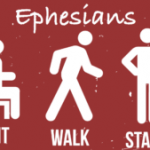

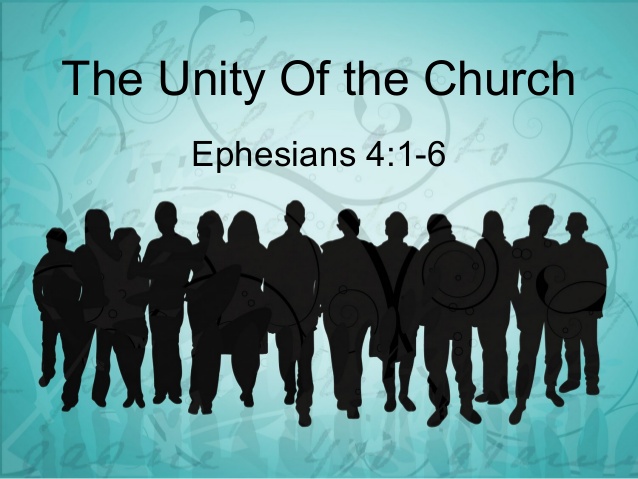
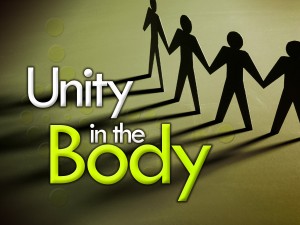 One body, one spirit, one hope, now, fourthly, in Ephesians 4:5, one Lord.
One body, one spirit, one hope, now, fourthly, in Ephesians 4:5, one Lord.


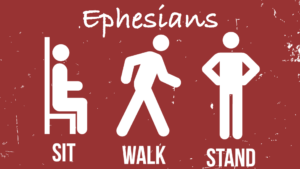
 Let me just say that the word “calling” has nothing whatsoever to do with God’s irresistible call of some people to eternal life. It is not about who goes to heaven after they die. Calling, as we see here, is about God inviting some people to get involved with His purposes for this world. It is call to serve Him and what He wants to do in this world.
Let me just say that the word “calling” has nothing whatsoever to do with God’s irresistible call of some people to eternal life. It is not about who goes to heaven after they die. Calling, as we see here, is about God inviting some people to get involved with His purposes for this world. It is call to serve Him and what He wants to do in this world. Did Jesus get angry? Yes, quite frequently. Remember when he cleared out the temple? Praotes, gentleness, does not mean never getting angry. It means getting angry at the right time, in the right measure, and for the right reason. It is the idea expressed in Ephesians 4:26, which says, “Be angry, and do not sin.”
Did Jesus get angry? Yes, quite frequently. Remember when he cleared out the temple? Praotes, gentleness, does not mean never getting angry. It means getting angry at the right time, in the right measure, and for the right reason. It is the idea expressed in Ephesians 4:26, which says, “Be angry, and do not sin.”




 How big is God? If you know some theology, you know that God is omnipresent. If we break this word down into two words. No matter where you are in the universe, God is there. He is everywhere. In fact, even when you get to the edge of the universe – where time and matter cease to exist, God does not stop there. He keeps going. That’s how big God is.
How big is God? If you know some theology, you know that God is omnipresent. If we break this word down into two words. No matter where you are in the universe, God is there. He is everywhere. In fact, even when you get to the edge of the universe – where time and matter cease to exist, God does not stop there. He keeps going. That’s how big God is. E. The Encouragement (Ephesians 3:20-21)
E. The Encouragement (Ephesians 3:20-21) He has had three prayer requests for the impossible, and then says God can not only do it, he can double do it – He can triple do it. He can run circles around it. He can do it with his eyes closed, and one hand tied behind his back. He can do exceedingly abundantly above all. If that’s not enough, look at the rest of verse 20. He can do above all that we ask or think! Paul says, God can do this and more. He says, if I can ask it, God can do it. If I can think it – or imagine it – God can do that too. In fact, God can do things I can’t even imagine! God can do things I can’t even think about!
He has had three prayer requests for the impossible, and then says God can not only do it, he can double do it – He can triple do it. He can run circles around it. He can do it with his eyes closed, and one hand tied behind his back. He can do exceedingly abundantly above all. If that’s not enough, look at the rest of verse 20. He can do above all that we ask or think! Paul says, God can do this and more. He says, if I can ask it, God can do it. If I can think it – or imagine it – God can do that too. In fact, God can do things I can’t even imagine! God can do things I can’t even think about!

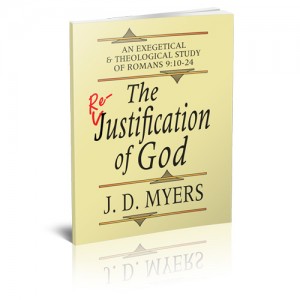


 1. God Provided
1. God Provided
 Some of the Jews were thinking, “You mean I have to go over to that Gentile’s house when he invites me over for dinner? I can’t do that! He might serve meat sacrificed to idols! He might not be following the strict cleanliness laws. I might become ceremonially unclean! Paul can’t be serious. There’s no way I can get along with them.”
Some of the Jews were thinking, “You mean I have to go over to that Gentile’s house when he invites me over for dinner? I can’t do that! He might serve meat sacrificed to idols! He might not be following the strict cleanliness laws. I might become ceremonially unclean! Paul can’t be serious. There’s no way I can get along with them.”